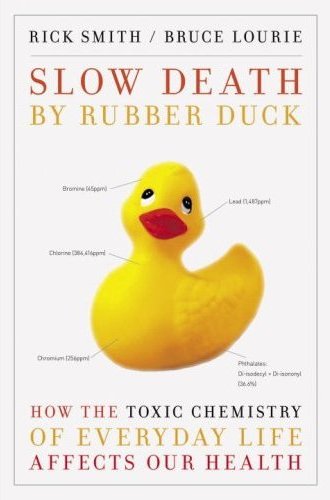I have to admit: when I picked up Slow Death By Rubber Duck, the new offering by Canadian environmental activists, Rick Smith and Bruce Lourie, I was at once hopeful and sceptical that this book would stand out from the growing list of titles issuing dire warnings about the state of our health and planet Earth.
I love a good industry-bashing as much as the next person, but something I can’t abide is holier-than-thou, statistically-saturated, fear-mongering warnings about the end of the world from earnest environmentalists. So, in cracking the spine to inhale that fresh-off-the-presses ink smell (should I worry about phthalates, lead or bromine?) I knew I was going to be a tough audience.
If you haven’t already heard, Smith and Lourie made themselves into test subjects to determine how seven different common chemicals — all of which are suspected to pose long-term health risks — would impact their own bodies’ pollution loads. The actual experiment only lasted a few days and forms a nice structure on which they base their book. But in my mind, the high concentration of several chemicals that the authors exposed themselves to over a long weekend is the least interesting part of the story, since the results, for the most part, were predictable.
What grabbed my attention and held it through all 300 pages was the way Smith and Lourie wove compelling evidence of the negative health impacts of common chemicals with concrete ways to learn to avoid them. For instance, the bubble bath our boys soak in and the scented Epson salts that I prefer, increase our bodies’ phthalate load, which is not a good thing and is entirely avoidable. Their advice is to stop buying personal care products that contain “fragrance” or “parfum,” which are industry’s code words for phthalates.
Another eye-opener for me was Smith and Lourie’s heads-up about the “special treat” food we sometimes enjoy, like microwave popcorn, and fast food burgers and chicken fingers. Who knew that a great deal of take-out food is wrapped in PFC-containing packages? PFCs are what make Teflon-coated pans so controversial and knowing that this chemical is used to keep grease from disintegrating the box my fries come in, changes my thinking about how “special” these treats are. The way to reduce our PFC exposure is simple: dust off our hot-air, popcorn-maker and figure out which restaurants will allow me to provide my own take-out containers.
Speaking of food containers, plastics have confounded me for years. I’ve never been able to remember which of the recycling numbers were okay for storing food and which ones I should avoid. Smith and Lourie helped solve that problem with this catchy mantra: “4, 5, 1 and 2: all the rest are bad for you.” I’ve already caught myself standing in the dairy section at the grocery store, looking at the bottom of yoghurt containers repeating this ditty out loud.
Using narrative, humour and real life scenarios, Slow Death By Rubber Duck has restored my faith in the environmental movement’s ability to make compelling points about toxins in our world, without beating us to death with a wagging finger. By the end of the fourth experiment (the authors write alternating chapters), I felt like I had gotten to know Rick and Bruce personally — and I wanted to spend a weekend with them, to hear their stories again, in-person.
One of the things that makes this book such an easy and enjoyable to read is that I could see myself in every single story they tell, from the personal (Rick’s struggle to decide if he should buy organic ketchup in a plastic container or non-organic ketchup in a glass container) to the universal (Bruce’s exploration of the health impacts caused by DDT used in pesticides in communities across North America).
Part history lesson, part science class, part Heloise’s Helpful Hints for creating a safer home, Slow Death By Rubber Duck is an engaging and empowering read with dozens of easy-to-implement, action items to help you reduce your consumption of toxins.–Donna Barker
Donna Barker is a freelance writer and former health columnist with Shared Vision magazine. She is currently working on her first book, about how to live a joyful life — and that would have to include not inadvertently poisoning oneself.




